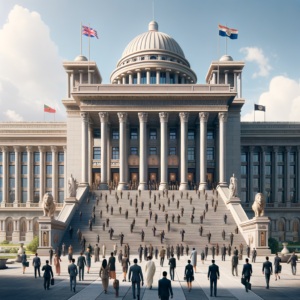Unveiling the Truth: The Hidden Drama Behind Congressional Debates
In the intricate tapestry of American governance, congressional debates serve as a critical forum for discussing and shaping legislation. However, the public often views these debates through a lens that may obscure the underlying complexities and influences at play. This article seeks to unveil the hidden drama behind congressional debates, exploring their structure, the role of party politics, the influence of lobbyists, media coverage, and the ultimate impact on legislation and policy outcomes.
Understanding the Structure and Purpose of Congressional Debates in the U.S.
Congressional debates are structured discussions held in the House of Representatives and the Senate, designed to deliberate on proposed legislation and national issues. These debates are governed by strict rules and procedures, which vary between the two chambers. In the House, debates are typically limited in time and are often more formal, with members required to adhere to specific protocols. In contrast, Senate debates can be more open-ended, allowing for extended discussions, amendments, and even filibusters. The primary purpose of these debates is to provide a platform for lawmakers to express their views, advocate for their constituents, and ultimately reach a consensus on legislative matters. However, the theatrical nature of these debates often belies the strategic maneuvering that occurs behind the scenes, as members seek to influence outcomes while maintaining their public personas.
The Role of Party Politics in Shaping Congressional Debate Dynamics
Party politics play a pivotal role in shaping the dynamics of congressional debates, often dictating the agenda and framing the issues at hand. Each party typically has a set of priorities that align with its ideological beliefs, which influences the topics that are brought to the floor for discussion. The majority party wields significant power in determining the legislative calendar and controlling the debate format, while the minority party often resorts to tactics such as amendments and procedural motions to voice dissent. This adversarial relationship can lead to polarized debates, where partisan lines are drawn, and collaboration becomes increasingly challenging. As a result, the rhetoric employed during these debates often reflects broader political strategies aimed at rallying support from constituents and reinforcing party loyalty, rather than fostering genuine dialogue.
Behind the Scenes: The Influence of Lobbyists and Special Interests
The influence of lobbyists and special interest groups is a significant yet often overlooked aspect of congressional debates. These entities invest substantial resources to advocate for specific policies and legislation that align with their interests. Lobbyists work tirelessly to build relationships with lawmakers, providing them with information, research, and even drafting legislative language. This behind-the-scenes activity can shape the content and direction of debates, as members may feel pressured to align their positions with the interests of their financial backers. Furthermore, the presence of lobbyists in congressional offices can lead to a perception of undue influence, raising questions about the integrity of the legislative process. As debates unfold, the interplay between elected officials and these external actors can complicate the public's understanding of the motivations driving policy decisions.
Media Coverage: How Reporting Affects Public Perception of Debates
Media coverage plays a crucial role in shaping public perception of congressional debates, often acting as a lens through which citizens view their government. News outlets provide analysis, commentary, and highlights from debates, which can influence how the public interprets the issues at stake. However, the nature of media reporting can sometimes prioritize sensationalism over substance, focusing on soundbites and conflicts rather than the complexities of the legislation being discussed. This can lead to a skewed understanding of the debates, where the public may become more engaged with the personalities involved rather than the policies being proposed. Additionally, the rise of social media has transformed the landscape of political discourse, allowing for real-time reactions and commentary that can further distort the narrative surrounding congressional debates. As a result, the interplay between media coverage and public perception remains a vital consideration in understanding the broader implications of legislative discussions.
The Impact of Congressional Debates on Legislation and Policy Outcomes
The impact of congressional debates on legislation and policy outcomes is profound, as these discussions often serve as the battleground for competing ideas and interests. While debates can illuminate the merits and drawbacks of proposed legislation, they also play a critical role in shaping the final form of bills. Amendments introduced during debates can significantly alter the trajectory of legislation, reflecting the concerns and priorities of various stakeholders. Moreover, the visibility of debates can galvanize public opinion, prompting constituents to engage with their representatives and advocate for or against specific measures. Ultimately, the outcomes of congressional debates can have far-reaching implications for governance, influencing everything from economic policy to social issues. However, the effectiveness of these debates in fostering meaningful dialogue and consensus remains contingent upon the willingness of lawmakers to engage constructively across party lines.
In conclusion, the hidden drama behind congressional debates reveals a complex interplay of structure, party politics, lobbying, media influence, and legislative impact. As these debates unfold, it is essential for the public to recognize the myriad factors that shape the discussions and decisions made by their elected representatives. Transparency in legislative discussions is crucial for fostering trust in the democratic process and ensuring that the voices of constituents are heard. By understanding the intricacies of congressional debates, citizens can better engage with their government and advocate for policies that reflect their values and priorities.
